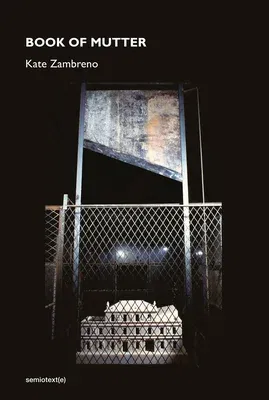A fragmented, lyrical essay on memory, identity, mourning, and the
mother.
Writing is how I attempt to repair myself, stitching back former selves,
sentences. When I am brave enough I am never brave enough I unravel the
tapestry of my life, my childhood.
*--*from Book of Mutter
Composed over thirteen years, Kate Zambreno's Book of Mutter is a
tender and disquieting meditation on the ability of writing,
photography, and memory to embrace shadows while in the throes--and dead
calm--of grief. Book of Mutter is both primal and sculpted, shaped by
the author's searching, indexical impulse to inventory family apocrypha
in the wake of her mother's death. The text spirals out into a fractured
anatomy of melancholy that includes critical reflections on the likes of
Roland Barthes, Louise Bourgeois, Henry Darger, Theresa Hak Kyung Cha,
Peter Handke, and others. Zambreno has modeled the book's formless form
on Bourgeois's Cells sculptures--at once channeling the volatility of
autobiography, pain, and childhood, yet hemmed by a solemn sense of
entering ritualistic or sacred space.
Neither memoir, essay, nor poetry, Book of Mutter is an
uncategorizable text that draws upon a repertoire of genres to write
into and against silence. It is a haunted text, an accumulative archive
of myth and memory that seeks its own undoing, driven by crossed desires
to resurrect and exorcise the past. Zambreno weaves a complex web of
associations, relics, and references, elevating the prosaic scrapbook
into a strange and intimate postmortem/postmodern theater.

